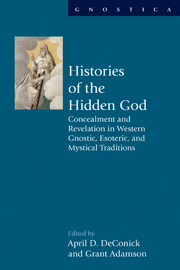 Histories of the Hidden God
Histories of the Hidden God Book contents
- Frontmatter
- Contents
- Acknowledgments
- Contributors
- Introduction: In search of the hidden God
- Part I Concealment of the Hidden God
- Part II The Human Quest for the Hidden God
- Part III Revelations of the Hidden God
- 11 Revealing and concealing God in ancient synagogue art
- 12 The invisible Christian God in Christian art
- 13 On the Mothman, God, and other monsters: The demonology of John A. Keel
- 14 Hidden away: Esotericism and Gnosticism in Elijah Muhammad's Nation of Islam
- 15 Conscious concealment: The repression and expression of African American Spiritualists
- 16 Occulture in the academy? The case of Joseph P. Farrell
- Afterword: Mysticism, Gnosticism, and esotericism as entangled discourses
- Bibliography
- Index
12 - The invisible Christian God in Christian art
from Part III - Revelations of the Hidden God
- Frontmatter
- Contents
- Acknowledgments
- Contributors
- Introduction: In search of the hidden God
- Part I Concealment of the Hidden God
- Part II The Human Quest for the Hidden God
- Part III Revelations of the Hidden God
- 11 Revealing and concealing God in ancient synagogue art
- 12 The invisible Christian God in Christian art
- 13 On the Mothman, God, and other monsters: The demonology of John A. Keel
- 14 Hidden away: Esotericism and Gnosticism in Elijah Muhammad's Nation of Islam
- 15 Conscious concealment: The repression and expression of African American Spiritualists
- 16 Occulture in the academy? The case of Joseph P. Farrell
- Afterword: Mysticism, Gnosticism, and esotericism as entangled discourses
- Bibliography
- Index
Summary
To whom then will you liken God, or what likeness compare with him? An idol? – A workman casts it, and a goldsmith overlays it with gold, and cast for it silver chains. As a gift one chooses mulberry wood – wood that will not rot – then seeks out a skilled artisan to set up an image that will not topple.
Isaiah 40:18-20Truly, you are a God who hides himself, O God of Israel, the Savior.
Isaiah 45:15These texts from Isaiah do not say that God is indiscernible, only that God is incomparable to anything in the known, material world. God is also beyond human view; according to John 1:18, no one has ever seen the Divine One. This hidden deity, immortal and dwelling in unapproachable light, is made known by the Eternal Logos, the First Born of Creation and the invisible God's image or eikon. God's hiddenness safeguards God's incomprehensibility, for seeing is a mode of perceiving. As Augustine long ago explained, we say “I see,” and mean “I understand.” Thus, God's absolute un-seeability signifies God's unknowability and maintains the distance (intellectual and physical) between Creator and creation. The bodily eye cannot glimpse God; the mind's eye cannot fathom the divine nature. Nevertheless, even as humans recognize the folly – even the danger – of their desire, they wish to see God. Denied the unobtainable, they have no basis even for speculating about the deity's appearance. As the Isaiah text above says: “to whom will you liken God?”
- Type
- Chapter
- Information
- Histories of the Hidden GodConcealment and Revelation in Western Gnostic, Esoteric, and Mystical Traditions, pp. 217 - 233Publisher: Acumen PublishingPrint publication year: 2013


